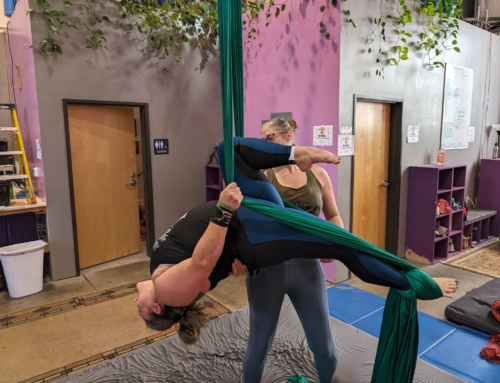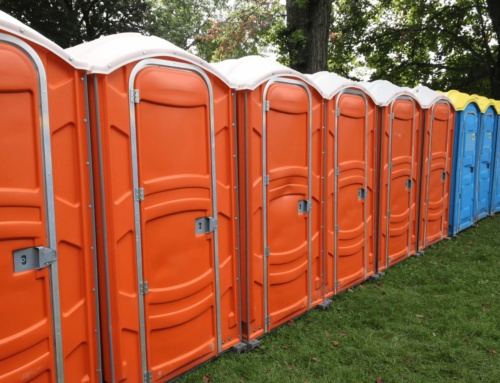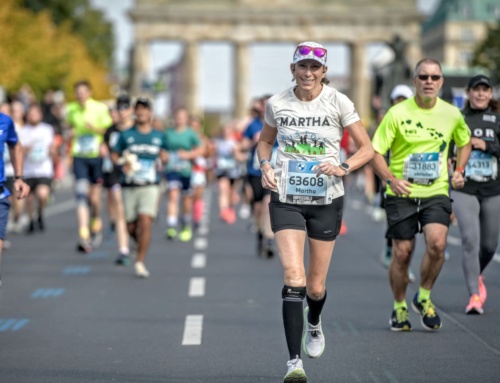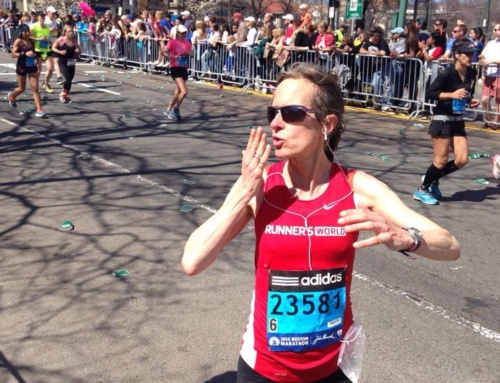
Pat (center), with two other grandmother runners.
As a child, I had asthma and my parents were told I wouldn’t live past the age of three. There were many late night trips to the ER for asthma attacks, but I survived them all. Still, I was glad to have an excuse to get out of P.E.—until junior high school, when I wanted to put on those frilly little bloomers and see the boys. I dated a boy in high school who ran track and I’d go watch his meets, but I could never imagine myself taking part in a running event. I was part of the generation before Title IX; girls didn’t do sports.
When my husband took early retirement, I was disappointed because I’d spent two decades raising three sons, who were now out of the house, and I felt like I’d missed that period where I was going to have time for myself. When he retired, it was almost like being a mom again. I fixed lunch and worried about the schedule. It felt like the chance to do something had been taken away.
Then my husband joined a group at a local running store, and he was quite proud of the progress he made running again after 25 years of not running. He kept saying I should join him, so I did—and it became something I did for myself.
Yes, 13.1 seemed crazy—but, thankfully, my asthma turned out to be allergy related. I made sure to take my medicine and changed my route to avoid heavy foliage areas like the Riverwalk in San Antonio, where we live.
I ran a full thirteen miles in training so I knew I could do the distance on race day. Still, I felt so much anxiety and apprehension the night before my first half. So many negative thoughts to push away. Thoughts like “I hope I can do this,” and, “have I adequately prepared?” ran through my mind all night. I trust my training and know I’ve been diligent. But maybe, I can’t do it. What if I don’t?
At starting line of my first half-marathon, the Rock ‘N’ Roll Marathon in San Antonio, I stand with members of the running group I’d trained with. My husband was ahead of me in a faster corral, as he had a qualifying time from doing this same race the year before. I know he’ll be at the finish line waiting for me.
To help me feel strong and confident, I’m wearing a straw cowboy hat embellished with bits of traditional Mexican embroidered fabric. In the corral, I get a lot of positive comments and high-fives about the hat; it reminds me this experience is going to be fun.
One of the things that get me through the hard parts—around miles 8 and 9 before we hit the double digits—is seeing others who are struggling. I say a good word to them, like, “we’re going to make it.” We’re in this together—and here are others who are just as unsure as I am.
I am not discouraged by the young fast ones. I know I’m not in that category. I’m not trying to be. It’s not that I set my expectations lower but I’m going to finish this and I’m going to have fun. Not once do I think I’m sorry I signed up for this.
I see my kids and grandbabies cheering on the sidelines. One of them holds a sign that reads, “My grandma can run faster than your grandma!” I feel so much pride and happiness. Their support means so much. The affirmation gives me the boost I need to finish strong.
When I cross the finish line, I’m overwhelmed with huge emotions. It’s kind of like childbirth. I hurt. I hope I don’t faint. I did it. What a high!
—Pat (Treats herself to a Mexican Coca-Cola after a long, hard run.)
PS: Pat’s running story has further evolved from last summer, which is when we did this interview.
In March, I learned about an inaugural marathon in November on South Padre Island. It is the first time I ever heard about a full marathon and think: I want to do that! For days I went back and forth over whether or not I should register. The answer was more often “no” than “yes” and always comes with negative thoughts like, ”You can’t do this. You’re too old.” The most positive thought I could muster was “you’re not getting any younger.”
What makes me finally hit send on the registration was reading the story about Elinor and Jodi Scott. Elinor, who had not been able to complete the final mile of her Boston marathon after the 2013 bombing, managed to do so just five months before she died of pancreatic cancer in 2014. Her sister Jodi decided she needed to run in Boston this year in honor of her sister and all of those who have pancreatic cancer.
It makes me tearful to think about all I would have missed if I had talked myself out of being a grandmother runner because I was “too old.” I would have missed so very many experiences I consider precious. Soon I can write about what it is like to run your first marathon when you are 64!






Congratulations, and thank you for sharing your story. What an inspiration!
I love the spirit Pat has, an amazing woman, indeed! I am looking forward to hearing about your marathon expierence. Please let us know when it is so we can all cheer and offer you love and support.
Good for you, Pat! What a great story!
Congratulations! You can do a marathon. It’s an experience you will never forget. I will be 59 this year (runniversary of six years is today), and I have run two marathons, eight halfs and countless 5ks and 10ks. Go get ’em!
Love! Congratulations and have a blast in your full. Can’t wait to read about it.
Oh, that is so awesome! So proud that you did not let “age” (whatever that means!) stop you from signing up!
You give me hope and are such an inspiration! I’m 62 and running my first half this month. I joined the AMR Half Marathon Challenge and have met so many amazing, confident and supportive younger women runners online. I’m sure I could be a mother to most of them, but age doesn’t seem to matter. It’s the fact that we’re all in this together, aspiring to a crazy dream and cheering each other on as we attempt to achieve it AND we will. Thank you for sharing your wonderful journey with us and GOOD LUCK on your MARATHON challenge. You rock, Pat!!
A great read this morning, as I get ready to go out of town for my first half this weekend. The same thoughts are going through my head about whether or not I’ve prepared enough, etc. I’ll be turning 50 in a month (just missed that age bracket!), and I’ve only been running for about 16 months. Pat mentioned passing people who were struggling during the race – that hadn’t even occurred to me and, in fact, brought tears to my eyes that she encouraged them. I will be on the lookout for someone who needs some encouragement, for it might be me at some point! Congratulations on your accomplishment, Pat.
I just love this!! That picture itself of you smiling ladies in your pink shirts is worth a thousand words! There is so much inspiration to be drawn from the stories of other women that AMR shares….maybe you need to start “another grandmother runner” division!! I can’t wait to heat the follow up of the full marathon recap….please share it once you finish, which I know you will! http://www.momontherunsanity.com
Thanks for sharing your story, Pat. Just what I needed to “hear” to calm the pre-half jitters ( got one tomorrow morning) and to help me hit “send” on that marathon application. You are an inspiration, lady!
Thank you for sharing your story! I’m 35, but this was so inspiring and wonderful to read!!! I’m cheering you on from FL and hope that you enjoy that marathon and get “the bug” to do more! You can do anything you set your heart to, as long as you listen to your body. Please share your journey with us mother runners!
Go Girl! Although I have been running since 1977, I never did any organized races other than fun runs until 2009 when I was 54. I have 8 halves under my belt since. Signed up for another this fall.
I know the thoughts that go through the brain. Just keep going!
Way to go Pat! At the retreat we learned a new phrase – BAGR – Badass Grandma Runner. That’s totally you! Thanks for the inspiration.
Pat:
I am so thrilled for you. This will be just your first marathon. I am closing in on age 70 and will be doing my 13th marathon in October having run my first at age 61. It’s definitely addicting.
I’m also delighted to know that there is a group of us older mother runners on AMR.
Will you be using the AMR marathon training program?
What great accomplishments: running the half and beginning your training for a full.
I started running at age 54, so I certainly relate. I haven’t yet run a half and may have to wait for retirement to get in the training miles. On the one hand, it’s hard for me to complete more than 3 miles before work; on the other hand, I remind myself that running 3 miles before work is pretty amazing. Thanks for sharing your inspirational story.
Your story made my Friday.
Your story just pushed any doubts I had swirling around in my head right out! You are absolutely AWESOME!!!!
Way to go Pat! You’re an inspiration to us all!!! :)
Thanks, Jo! Love it! Do you think Sarah and Dimity might make some BAGR shirts available?
Ah! Keating! Need to visit with you ASAP! Definitely using the AMR program though it is a daunting challenge to me at this point! Maybe with your input I can do it justice. I know it works if you work it! I too am delighted to know there is such a great group of older mother runners on AMR. It definitely encourages me, as does your example!!
I’m trying to reply to you all’s very kind and gracious comments but they seem to be coming out as comments rather than replies! Nonetheless, thank you! I feel in good company. AMR refers to all of us as a tribe, and today I am feeling like we older mother runners are as much a part of the tribe as the young PR setting crowd. Guess we aren’t riding out to sea on that old ice floe assigned to the elderly they joke about after all! I think Another Grandmother Runner would be a great addition to the AMR community! Sarah and Dimity, thank you for the good job you do of being so inclusive as you encourage!! Thank you for letting us all share our stories. I can’t imagine running without being a part of of this group!
You’re incredible! I’m 32 and just ran my first full marathon. I hope to keep your energy and positivity and still kick butt when I’m a grandma.
I love it! when the 20 somethings pass me (everyone passes me) I am okay with it too. I tell myself I’m old enough to be their mother (not grandmother yet). I’m glad I’m running and I certainly have plans to do my first marathon after I turn 50 (later this year). Every older woman running is an inspiration to me. Great job!
Go Pat! Can’t wait to read your marathon story!
This is wonderfully impressive and inspiring. I can’t wait to hear about her first marathon!
What an inspirat.ion! I hope I will be running a marathon when I am in my sixties
How awesome! I am a 44 y.o. mother runner, and I hope I look as fit, healthy, and super cute as you and your friends do when I am a grandmother runner!
Pat Brockman,
You are the best running buddy any woman could have! You are selfless, help me find the “emegency” potties, run slow when I’m recovering from surgery, encourage even when you are a tad discouraged yourself, you find time to “grandmother” the DRG babies, encourage the new runner mommies with your running AND life advice, and and huge part the what makes the Downtown Run Group in San Antonio such a special group. I just flat out love you.